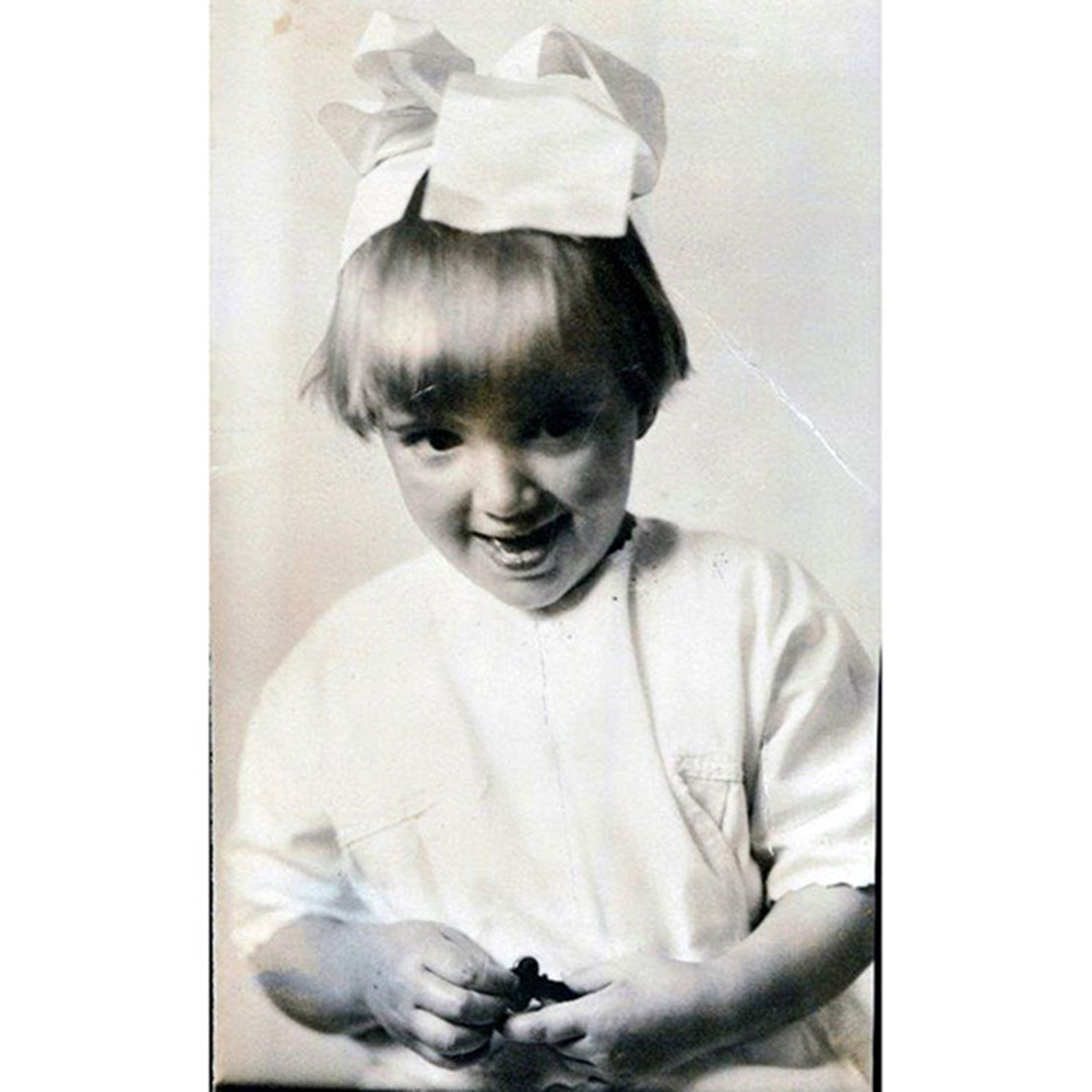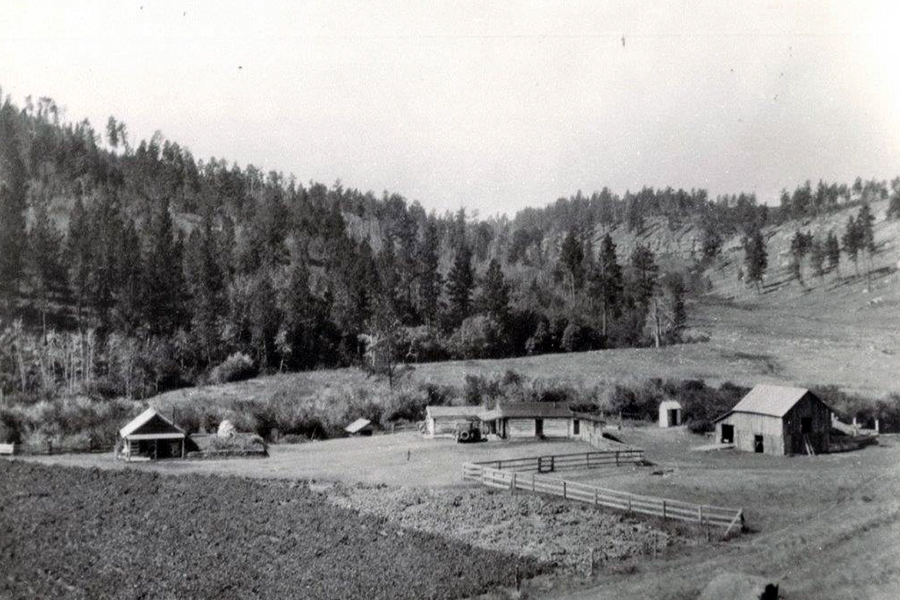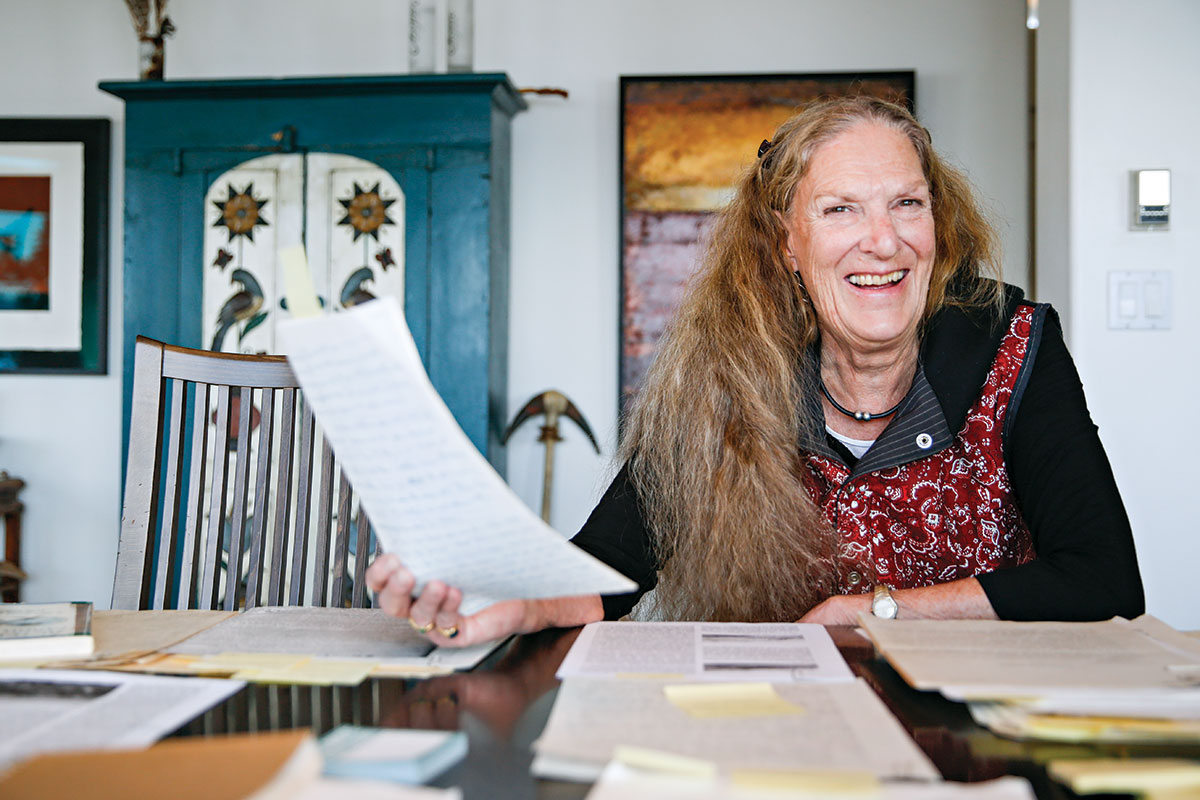Sickness Through the Ages
The late Betty Wetzel, a Bigfork writer who passed away in 2018, wrote this personal essay about surviving the 1918 pandemic as a child. One of Wetzel’s daughters discovered the unpublished piece, written in the mid-1990s, while sorting through her mother’s work and shared it with Flathead Living.
By Betty Wetzel
Editor’s Note: At the bottom of this essay is a companion story about Wetzel’s life and writings, featuring interviews with her daughters.
Before I was 6 years old I had survived the 1918 influenza, a worldwide pandemic that was said to have killed more than 20,000,000 people. In the United States 540,000 died. I had also survived whooping cough, measles, mumps and typhoid fever.
Day after feverish day I spent upstairs in bed, burning and chilling and enduring alternatively the pharmacology of my mother and our family doctor, who made house calls. My mother favored castor oil, enemas, mustard plasters and alcohol rubs. Dr. Pigot leaned toward castoria, aspirin, bad-tasting cough medicine, and a white powder to be dissolved in water. The powder came in gum wrappers.
Three days after each fever subsided, my father would carry me down to the living room, where I lay wrapped in blankets on the leather sofa before the fireplace. It was strange how the downstairs had changed — grown larger and brighter — during each absence. I was too weak to stand.
I survived all these diseases with only the lingering afflictions of swollen neck glands and earaches. Treatment for earaches, caused by abscesses inside the ears, was to lie on the aforementioned sofa with my ear on a hot water bottle and a damp towel. The moist heat supposedly caused the abscesses to swell and eventually to break and drain.
By then I was in first grade. I attended school with cotton in my ears and a flannel cloth around my neck. Many of my schoolmates were similarly bedecked. Nobody noticed or commented.
My mother, famous as a practical nurse, earned the title. She not only pulled her three children through the above diseases, but nursed her frail, chain-smoking editor husband through annual bouts of influenza and pneumonia as well. As a matter of course, our grandparents lived with us until their octogenarian deaths. Grandma was a complete invalid from rheumatoid arthritis. My mother was known to be “a worker” and she was never known to be ill.

But she didn’t win them all. Her beloved first baby died at 17 months from infant diarrhea. And a blizzard prevented her getting to the ranch to save her youngest brother from the 1918 flu. The dreaded pneumonia, which took its greatest toll on healthy young men, had already set in.
Her own mother, who came to Montana on an immigrant train from Kansas in 1891, raised 10 children — five of each sex — to maturity on homesteads on the prairie near Great Falls and Lewistown. She treated illnesses and hurts with baking soda, turpentine, kerosene and the native plants and herbs she had learned about from a neighboring Indian woman called Kippertack. Kippertack also delivered two of her babies.
My own children suffered through measles, mumps and chicken pox, and one of them had scarlet fever, but the dreaded after-effects were treated by the timely discovery of the sulfonamide drugs in the late 1930s and the subsequent discovery of penicillin.
It makes one wonder where it will all end. Our daughters have been spared the age-old anguish of unwanted pregnancies due to the invention of “the pill” and other attendant devices, and another pill prevents our youngest daughter and her husband from experiencing PMS, a joked-about ailment said to reside in the imagination of neurotic females in my day.
Vaccination has prevented our grandchildren from having ANY “childhood diseases.” Moreover, the wonders of fluoridination have wrought six teenagers without a single cavity among them.
What are we breeding here? Will these perfect, unblemished, disease-free young people one day fall prey to a pandemic of germ warfare?
I got to thinking of all this the other day when I read that some 35 million Americans are without health insurance. I wonder if they could make do with a hot-water bottle, kerosene and aspirin. Are today’s germs and viruses more lethal or are today’s citizens more frail and less inventive?
Looking back over it all, I’m glad I’ve got health insurance. And I’m glad my grandmother had Kippertack for a neighbor.
*******************
Discovering Betty Wetzel
By Myers Reece

When the writer Betty Wetzel passed away in 2018, she left behind a trove of unfinished and unpublished work. One of her daughters, Gretchen Rittberg, has since taken on the daunting task of sorting through the stacks: partially completed manuscripts punched out on Wetzel’s IBM Selectric typewriter, alongside reams of hand-scribbled notes and essay fragments.
As Rittberg worked through the papers at her Bigfork home, she came across an outlier, a short essay that stood alone as a complete piece with a unique perspective she hadn’t seen in the other writings. It was “Sickness Through the Ages,” the essay that appears in the preceding pages of this magazine.
“I was pretty dumbfounded when I came across it in the form that it was in,” Rittberg said.
While Wetzel had written plenty about the experience of other family members during the 1918 Spanish flu pandemic, this essay was a distinctly personal glimpse of her own bout with the influenza. Though only a toddler when the flu afflicted her, the sickness affected her deeply, both psychologically and physically, as she carried the memories, deaths of relatives and hearing loss with her for life.
“It had a tremendous effect on her life,” daughter Becky Wetzel said.
Betty Eiselein was born in Roundup, the daughter of Alfred Eiselein, a longtime newspaperman who founded the Roundup Record Tribune. Young Wetzel grew up in the newspaper industry and “cut her teeth” working for her father’s paper, according to Becky.
But rather than take over the family business as her father hoped, she opted to spread her wings and see the world, dashing away to New York after high school.
“It broke grandpa’s heart because he wanted her to take over the newspaper,” Becky said. “But she didn’t stay in Roundup. She wanted to see the world.”
Wetzel returned to the Treasure State and earned a journalism degree from the University of Montana. She married Winston Wetzel, and traversed the state with him to his various school superintendent jobs in Roundup, Glendive, Whitefish and Missoula. The Wetzels then lived for a period in the former East Pakistan, where Winston set up schools through the Ford Foundation and University of Chicago. Wetzel worked in a cholera research lab in East Pakistan.
Despite her journalism degree and talent for writing, the responsibilities of motherhood and the norms of the times prevented Wetzel from committing herself fully to the profession.
“In a different time, she would have had a career in journalism or writing,” Becky said.
Still, even while raising four kids and taking on an assortment of jobs, Wetzel practiced her craft, and then found time to pursue it in earnest after her children had left the nest. Working in a loft at her Bigfork home, she completed works that were featured in a wide range of publications, from her local Bigfork Eagle to Montana Magazine to The New York Times.

Wetzel also traced the path that Mark Twain took across the world for his travelogue “Following the Equator,” conducting research for her own book called “After You, Mark Twain: A Modern Journey Around the Equator.” The back cover of Wetzel’s book features glowing blurbs from former U.S. Sen. Mike Mansfield and Lester C. Thurow, the former dean of the Sloan School of Management at M.I.T.
Becky and Gretchen believe “Sickness Through the Ages,” written in the mid-1990s, is particularly relevant right now with the ongoing COVID-19 pandemic. Access to this century-old “oral history,” Becky said, can help us better understand our current moment.
“It’s so interesting to think that in 1918 my mom actually had the 1918 flu, and just over 100 years later here we are again,” Becky said.
Wetzel lived to be 102 years old, and though her writing slowed in her final years, her voracious reading barely missed a step. She would sit in a chair in her living room, tearing through anything with words: books, newspapers, magazines. Becky recalls one of her caregivers asking, “What was that you just read?”
“I don’t remember,” Wetzel responded.
The caregiver asked her why she read if she couldn’t even remember it.
“Because I like the words,” she said.